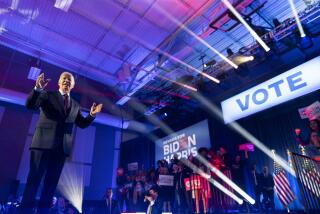POLITICAL POLLS : THE PULSE OF POPULARITY
- Share via
Polls of voters since the Persian Gulf War show soaring ratings for President Bush, and are prompting predictions that his reelection is inevitable. But a look back at some previouselections shows that such early views may prove myopic. As Democratic strategists and independent opinion analysts point out, a poll is only a snapshot in political time. With 18 months to go until Election Day, here is how things are shaping up for Bush. The Foreign Policy Factor President Bush’s current popularity is based heavily on his foreign policy record, particularlyin his handling of the Persian Gulf crisis. But such perceptions are considered politcally transitory and particularly sensitive to events. The party in the White House generally benefits from turmoil overseas, because voters tend to believe that the party in power offers the best chance for peace. ‘Foreign policy crisis have great impact because they are dramatic and they transcend normal political concerns,’ says Robert Lichter, co-director of the nonpartisan Center for Media and Public Affairs. This chart shows results of periodic Gallup Organization surveys tied to world events that asked which party was more likely to keep the United States out of war:
Political Party Event Date Rep. Dem. *Korean War ends July, 1953 27% 21 Cuban missile crisis October, 1962 23% 32 Tonkin Gulf Resolution August, 1964 20% 44% Tet offensive begins January, 1986 41% 23% *Nixon visits China February, 1972 32% 28% Iran takes U.S. hostages November, 1979 25% 42% USSR invades Afghanistan December, 1979 25% 42% *Eastern Europe opens November, 1989 36% 34%
For the record:
12:00 a.m. April 18, 1991 For the Record
Los Angeles Times Thursday April 18, 1991 Home Edition Part A Page 3 Column 1 Metro Desk 1 inches; 23 words Type of Material: Correction
Polling--President Bush had a 70% approval rating in the month after his May, 1989, trip to Europe. A graphic in Wednesday’s editions showed an incorrect percentage.
Source: Mellman-Lazarus and the Gallup Organization *GOP in White House Party Identification Party allegiance likewise can be transitory, as the following chart illustrates. GOP leadersrejoiced recently in a poll that gave them their biggest lead in many years in the number of voters willing to identify themselves as Republicans rather than Democrats or Independents.But Democrats point out that the GOP also got a big boost in party identification from Reagan’s 1984 landslide reelection victory, yet eventually fell behind the Democrats. And more recent soundings have already shown some slippage in GOP popularity. 1984 Republican: 31% Democratic: 40% Independent: 29% 1985 Republican: 33% Democratic: 38% Independent: 29% 1988 Republican: 30% Democratic: 42% Independent: 28% 1990 Republican: 32% Democratic: 40% Independent: 28% March, 1991 Republican: 36% Democratic: 29% Independent: 35% Source: Gallup, Times Mirror Poll. Early Polls and Front-Runners *Early polls in the past three presidential elections were dramatically wrong. In each case, the eventual winner was trailing badly in the year before the election. This year’s early polls have pitted Bush against New York Gov. Mario M. Cuomo and Sen. Bob Kerrey of Nebraska(one possible ticket) and give the Bush-Quayle ticket an enormous advantage. Feb., 1983 Reagan: 41% Mondale: 47% Jan., 1987 Bush: 38% Hart: 51% March, 1991 Bush / Quayle: 74% Other / Undecided: Cuomo / Kerrey: 17% Source: 1979, 1983 and 1987, Gallup Organization; 1991, Times Mirror How Is Bush Doing? * Voters’ judgments sometimes shift dramatically over time, depending on events. ThePresident has generally enjoyed a high approval rating, capped by recent polls at the conclusion of the Gulf War. 1989 1-26-89: 51%3-2-89: “Honeymoon”: 63% 5-7-89:56% 6-11-89: May trip to Europe: 63% 7-9-89: 66% 8-13-89: July trip to Europe: 69% 9-10-89: 70% 11-5-89:70% 1990 1-7-90: Panama invasion: 80% 3-11-90: 68% 5-20-90: 65% 7-3-90: 63% 8-12-90: Persian Gulf deployment: 74% 9-2-90: 74% 10-28-90: Budget controversy: 54% 1991 1-6-91: 58% 1-20-91: Gulf War under way: 82% 3-3-91: After Gulf War victory: 89% Poll Source: Gallup Organization
Times researcher Aleta Embrey contributed to this report.
More to Read
Get the L.A. Times Politics newsletter
Deeply reported insights into legislation, politics and policy from Sacramento, Washington and beyond. In your inbox twice per week.
You may occasionally receive promotional content from the Los Angeles Times.










